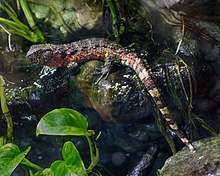Chinese crocodile lizard
The Chinese crocodile lizard (Shinisaurus crocodilurus) is a semiaquatic lizard found only in cool forests in the Hunan, Guangxi and Guizhou Provinces of southern China, and the Quảng Ninh Province in northern Vietnam. The Chinese crocodile lizard spends much of its time in shallow water or in overhanging branches and vegetation, where it hunts its prey of insects, snails, tadpoles, and worms. Individuals in captivity may be fed baby mice.[3] A rare and little-studied lizard, it is listed in CITES Appendix II, which regulates international trade of specimens.[2] This is the only species in the monotypic genus Shinisaurus.[4]
| Chinese crocodile lizard | |
|---|---|
 | |
| At the Newport Aquarium in Newport, Kentucky | |
| Scientific classification | |
| Kingdom: | Animalia |
| Phylum: | Chordata |
| Class: | Reptilia |
| Order: | Squamata |
| Family: | Shinisauridae |
| Genus: | Shinisaurus Ahl, 1930 |
| Species: | S. crocodilurus |
| Binomial name | |
| Shinisaurus crocodilurus Ahl, 1930 | |
Taxonomy
Shinisaurus (literally "Shin's lizard") honours the biologist Sin Shu-szi (Chinese: 辛树帜; pinyin: Xīn Shùzhì), a member of a joint Chinese-German expedition that discovered this species (as well as the frog Quasipaa shini).[5] Its specific name – like the separate genus Crocodilurus – means "crocodile-tail".[6]
Shinisaurus was once also regarded as a member of Xenosauridae, but most recent studies of the evolutionary relationships of anguimorphs consider Shinisaurus to be more closely related to monitor lizards and helodermatids than to Xenosaurus. It is now placed in its own family: Shinisauridae.
Two subspecies are recognized:[7][8]
- Shinisaurus crocodilurus crocodilurus Ahl, 1930 (southeast China)
- Shinisaurus crocodilurus vietnamensis Schingen et al., 2016 — Vietnamese crocodile lizard (northeast Vietnam)
Description
The Chinese crocodile lizard is green, colored with reddish neck markings and alternating bands of light and dark marks. Males are more colorful than females, especially during the breeding season. They are 40–46 cm (16–18 in) long. Perhaps its most distinctive features are the rows of enlarged, bony scales down its back and muscular tail that resemble those of a crocodile.[9]
Conservation
A 2008 study estimated 950 crocodile lizards left in China.[4] The same year it was estimated that fewer than 150 adults were left in Vietnam.[8] Habitat loss is a major threat to the species.[1] It has been listed on CITES Appendix II since 1990;[2] there are low levels of legal exports for the pet trade with CITES permits, but it is believed that illegal collection occurs at a higher level.[1] In 2014, it was listed as endangered on the IUCN Red List based on severe population declines and ongoing threats.[1]
References
- Nguyen, TQ; Hamilton, P; Ziegler, T (2014). "Shinisaurus crocodilurus ". IUCN Red List of Threatened Species. 2014. Retrieved 12 June 2014.
- "Chinese Crocodile Lizard". Retrieved 2013-05-17. CITES Web Gallery.
- Chinese Crocodile Lizard (Shinisaurus crocodilurus). The Sacramento Zoological Society.
- Huang, C. M., et al. (2008). Population and conservation strategies for the Chinese crocodile lizard (Shinisaurus crocodilurus) in China. Animal Biodiversity and Conservation 31(2) 63-70.
- Beolens, Bo; Watkins, Michael; Grayson, Michael (2011). The Eponym Dictionary of Reptiles. JHU Press. p. 242. ISBN 978-1-4214-0135-5.
Shu-szi Sin led an expedition to southern China. His name was [pronounced] as “Shin” by the other expedition participants, who were all German.
- The Vivarium. American Federation of Herpetoculturists. 1989.
In 1930, he christened the new species Shinisaurus crocodilurus (literally, "Shin's lizard with crocodile's tail").
- Shinisaurus crocodilurus at the Reptarium.cz Reptile Database. Accessed 17 February 2018.
- Schingen; Le; Ngo; Pham; Ha; Nguyen; Ziegler (2016). "Is there more than one Crocodile Lizard? An Integrative Taxonomic Approach Reveals Vietnamese and Chinese Shinisaurus crocodilurus Represent Separate Conservation and Taxonomic Units". Zool. Garten N.F. 85 (5): 240–260. doi:10.1016/j.zoolgart.2016.06.001.
- Wilson, Don W.; Burnie, David (2001). Animal. London: DK. p. 422. ISBN 0-7894-7764-5.
| Wikimedia Commons has media related to Shinisaurus crocodilurus. |
| Wikispecies has information related to Shinisaurus crocodilurus |
